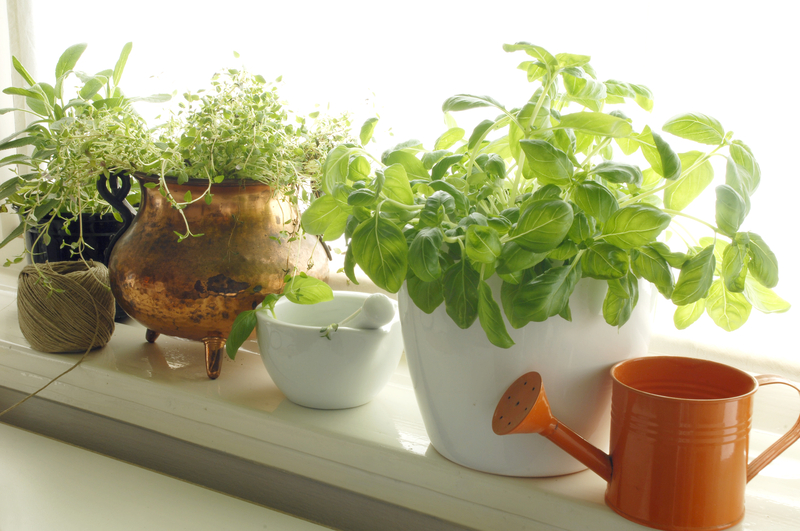Keeping Garden Herbs Fresh
Posted on 01/06/2025
Cultivating a garden filled with lush and aromatic herbs can be a source of immense joy and satisfaction. However, the challenge often arises in keeping these delightful garden herbs fresh once they have been harvested. Effective preservation techniques are crucial in ensuring that the vibrant flavors and beneficial properties of herbs are retained for prolonged periods. This article delves into the best practices for maintaining the freshness of your garden herbs, enabling you to savor their garden-fresh aroma and taste long after they've been picked.
1. Understanding Herb Varieties
Before delving into specific preservation methods, it's imperative to understand that different herbs have varying shelf lives. Soft herbs like basil, cilantro, and parsley tend to wilt faster, whereas woody herbs like rosemary, thyme, and sage have greater longevity. Recognizing the characteristics of your herbs will help you apply the most suitable preservation techniques.

2. Harvesting Herbs Correctly
Proper harvesting is the first step in ensuring herb freshness. Ideally, herbs should be picked early in the morning when their essential oils are most concentrated. Use sharp scissors or garden shears to make clean cuts, reducing the risk of damage to the plant and potential bruising of the leaves.
3. Washing and Drying Herbs
After harvesting, thoroughly wash the herbs under gently running water to remove any dirt or pests. To dry the herbs, gently pat them with a clean kitchen towel or use a salad spinner. Ensuring the herbs are dry is crucial because excess moisture can lead to quick spoilage.
4. Methods of Keeping Herbs Fresh
There are several methods you can employ to keep your herbs fresh:
Refrigeration
For soft herbs, refrigeration is a highly effective preservation method. Trim the stems and place the herbs in a glass of water, much like a bouquet of flowers. Cover the glass with a plastic bag and store it in the refrigerator. Change the water every few days to maintain optimal freshness.
Freezing
Freezing is an excellent option for long-term storage. Chop the herbs and place them in ice cube trays, filling each compartment with water or olive oil before freezing. Once frozen, transfer the herb cubes to a freezer bag for easy use in cooking.
Drying
Drying is suitable for woody herbs. Hang small bunches upside down in a well-ventilated area away from direct sunlight. Alternatively, you can use a food dehydrator or an oven set to its lowest temperature to dry the herbs.
Storing in Oil
Certain herbs, like basil and oregano, can be preserved in oil. Finely chop the herbs and mix them with good quality olive oil. Store the mixture in the refrigerator in airtight containers.
5. Tips for Extending Freshness
Avoid exposing fresh herbs to direct sunlight and excessive heat.
Store dried herbs in airtight containers away from light and moisture.
Use dried herbs within a year for the best flavor.
Regularly prune and harvest your garden herbs to encourage new growth.
6. Pros and Cons of Different Preservation Methods
Refrigeration
Pros: Maintains fresh flavor, easy to access.
Cons: Short-term solution, takes up refrigerator space.
Freezing
Pros: Long-term storage, convenient for cooking.
Cons: May affect texture, requires freezer space.
Drying
Pros: Long shelf life, doesn't require refrigeration.
Cons: Flavor may diminish over time, labor-intensive process.
Storing in Oil
Pros: Adds flavor, ready to use in recipes.
Cons: Requires refrigeration, risk of botulism if not done correctly.

Takeaways
Different herbs require different preservation methods.
Proper harvesting and drying techniques are crucial.
Refrigeration, freezing, drying, and storing in oil are effective preservation methods.
Regular maintenance and proper storage can prolong the life of garden herbs.
Conclusion
Keeping your garden herbs fresh is a rewarding endeavor that enhances your culinary experiences and reduces waste. By understanding your herb varieties and applying suitable preservation techniques, you can ensure that the delightful flavors and aromas of your garden herbs are available year-round. Whether you opt for refrigeration, freezing, drying, or storing in oil, each method has its unique benefits and considerations. With these tips and methods, you'll be well-equipped to enjoy your garden's bounty for months to come.
Latest Posts
Easy Ways to Freshen Up Your Patio and Paving for Summer
Unique Autumn Garden Inspiration: Planting with the Season in Mind
Quick and Effective Ways to Sharpen Your Garden Shears at Home
Easy Ways to Keep Your Artificial Turf Looking Brand New
Elevate Tranquility With These Zen Garden Planting Inspirations






 Certified and experienced landscapers
Certified and experienced landscapers



 Get a Quote
Get a Quote